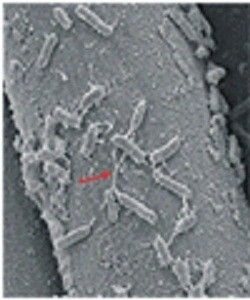Super Space Bugs Generate Electricity

Scientists have discovered that space bugs can generate electricity.
Scientists from Newcastle University have discovered that space bugs - Bacillus stratosphericus and Bacillus altitudinis - bacteria normally found 30km above the earth have been identified as highly efficient generators of electricity.
Bacillus stratosphericus and Bacillus altitudinis are microbes commonly found in high concentrations in the stratosphere orbiting the earth but these microbes were spotted near the river Wear, which is located at Wear Estuary, Country Durham in the UK. Scientists believe that they were brought down to earth because of atmospheric cycling processes, according to a press release from the university.
During the experiment, they had collected 75 different species of bacteria near river Wear. They tested these bacteria by using a Microbial Fuel Cell (MFC), a bio-electrochemical system that converts organic compounds directly into electricity by a process known as bio-catalytic oxidation. They discovered that the best species of bacteria like Bacillus stratosphericus and the Bacillus altitudinis were able to create an artificial biofilm that doubles the electrical output of the MFC from 105 milliwatts per cubic metre to 200 milliwatts per cubic metre.
Even though the electricity generated was too little, they believe that it could provide electricity to some parts of the world, where there is no electricity.
Until now, the biofilm has been allowed to grow unchecked but this new study shows for the first time that by manipulating the biofilm you can significantly increase the electrical output of the fuel cell.
"What we have done is deliberately manipulate the microbial mix to engineer a biofilm that is more efficient at generating electricity," said Grant Burgess, Professor of Marine Biotechnology from the Newcastle University.
"This is the first time individual microbes have been studied and selected in this way. Finding Bacillus stratosphericus was a surprise but what it demonstrates is the potential of this technique for the future - there are billions of microbes out there with the potential to generate power," he said.
© Copyright IBTimes 2025. All rights reserved.



















